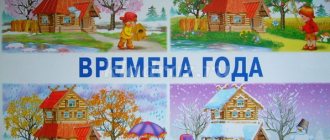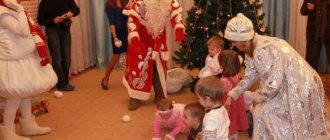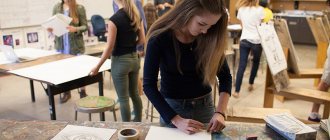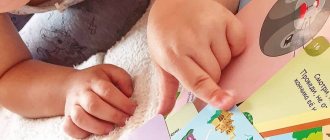LESSON STRUCTURE:
- Greetings and game exercises for attention and observation.
- Speech technique exercises.
- Tasks on plastic movements.
- Outdoor games.
Each lesson should contain some new element, exercise, task or game.
Hello kids, girls and boys!
Let's get to know you!
My name is Nonna Vladimirovna!
(I get to know the students in a playful way - I throw the ball, they throw the ball back to me, saying their name, or pass the ball to each other, also saying their name)
Guys, show me your five fingers:
Each finger greets the thumb and says “Hello” to it.
First slowly, then faster (3-5 times).
Now we will do an exercise, pronouncing the following text:
Finger on finger - knock, knock, knock!
Palm on palm - clap, clap, clap! Foot on the floor - top, top, top!
Now clench your hands into fists.
When naming a finger, we bend each finger simultaneously on both hands:
My little finger, where have you been?
— With the nameless one, I cooked cabbage soup.
And with average - I ate porridge.
And the big one met me
And he treated me to candy.
Today we will begin a long journey into the world of theater. Do you know who invented THEATER?
Theater was invented by the ancient Greeks and theater means SPECTRUM, people portrayed different heroes: bad and good, evil and kind, cheerful and sad.
Guys? What fairy-tale characters do you know? (there is a dialogue with the children).
Theater is magic! He can do everything.
We can go wherever we want.
Let's stand in a circle.
Extracurricular activity. Theater Club.
Thematic planning of a circle lesson
"Theatrical"
| №p/p | date | Lesson topic | Contents of the activity | Educational work. | ||
| Theoretical part of the lesson (form of organization) | Practical part of the lesson (form of organization) | |||||
| 1. | Introductory lesson. | Introduce the work plan for the academic year. what is theater; how does theater differ from other forms of art? | They express their opinions and wishes. | The ability to express your opinion. | ||
| 2. | Theater game. | Articulation gymnastics. Introduce the concept of “theater play”. | Acting out the situation at the suggestion of the children. | Understand other positions, views, interests | ||
| 3. | Individual lesson. | Working on the word. Practicing individual sketches. Elimination of diction deficiencies.
| They perform various pantomimes and are able to pronounce a monologue and dialogue. | Negotiate with people, coordinating your interests and views with them in order to do something together. | ||
| 4. | Theater game. | Talk about the basic technical means of the stage about stage design about the norms of behavior on stage and in the auditorium Introduce the concept of “pantomime”, “stage miniature”. The ability to select poems about autumn. | Expressive reading of selected poems. | Cultivate a love for nature. | ||
| 5. | Theater game. | Articulation gymnastics. Introduce the concept of “theater play”. | They sing the song “Autumn has knocked on us.” | Cultivate a love for nature. | ||
| 6. | Theater game. | Articulation gymnastics. Introduce the concept of “theater play”. | Prepare drawings about autumn. They rehearse songs and poems. | Cultivate a love for nature. | ||
| 7. | Theater game. | Articulation gymnastics. Introduce the concept of “theater play”. | They rehearse songs and poems. | Cultivate a love for nature. | ||
| 8. | Celebration "Ball of Vegetables and Fruits". |
| Rhythmic, musical, plastic games and exercises. They read poetry, sing songs, and participate in competitions. | Foster collectivism. | ||
| 9. | Theater game. | Reinforce the concept of “theatrical play”. | Acting out episodes from Russian folk tales. | Instill a love of reading. | ||
| 10. | Theater game. | A selection of amateur performances. | They rehearse their numbers and know how to behave on stage. | Foster a love of creativity. | ||
| 11. | Theater game. | Articulation gymnastics. Introduce the concept of “theater play”. | Practicing amateur performances. | Foster a love of creativity. | ||
| 12. | Theater game. | Articulation gymnastics. Introduce the concept of “theater play”. | They are holding a poetry competition. | Foster a love for winter nature. | ||
| 13. | Culture and technique of speech. | Articulation gymnastics. Elimination of diction deficiencies and training of correct diction. Breathing exercises. Speech voice production. Speech in motion. Collective writing of fairy tales. Dialogue and monologue. Working on a poem and song. Learning a song about winter. Learning the skit "New Year's Tale" | They sing the song “Ice Ceiling”. | Foster a love of creativity. | ||
| 14. | Culture and technique of speech. | Articulation gymnastics. Elimination of diction deficiencies and training of correct diction. Breathing exercises. Speech voice production. Speech in motion. Collective writing of fairy tales. Dialogue and monologue. Working on a poem and song. Rehearsal of the skit "New Year's Tale" | Prepare drawings about winter. Rehearsal of songs and poems. | Foster a love of creativity. | ||
| 15. | Culture and technique of speech. | Articulation gymnastics. Elimination of diction deficiencies and training of correct diction. Breathing exercises. Speech voice production. Speech in motion. Collective writing of fairy tales. Dialogue and monologue. Working on a poem and song. Rehearsal of the skit "New Year's Tale" | Prepare decorations for your class. Rehearsal of songs and poems. | Foster a love of creativity. | ||
| 16. | Holiday "New Year's Tale". |
| They read poetry, sing songs, and participate in competitions. | Foster a love of creativity, foster collectivism. | ||
| 17. | Culture and technique of speech. | Articulation gymnastics. Elimination of diction deficiencies and training of correct diction. Breathing exercises. Speech voice production. Speech in motion. Collective writing of fairy tales. Dialogue and monologue. Working on a poem and song. The ability to choose poems about spring. | They are holding a poetry competition. | Cultivate a love for spring nature. | ||
| 18. | Culture and technique of speech. | Articulation gymnastics. Elimination of diction deficiencies and training of correct diction. Breathing exercises. Speech voice production. Speech in motion. Collective writing of fairy tales. Dialogue and monologue. Working on a poem and song. Learning a song about spring. | They sing the song “Spring Drops”. | Cultivate a love for spring nature. | ||
| 19. | Culture and technique of speech. | Articulation gymnastics. Elimination of diction deficiencies and training of correct diction. Breathing exercises. Speech voice production. Speech in motion. Collective writing of fairy tales. Dialogue and monologue. Working on a poem and song. | Round dance “There was a birch tree in the field.” | Cultivate love for native nature. | ||
| 20. | Celebration “Thank you, ABC!” |
| They sing songs, dance in circles, recite poems. | Foster collectivism. | ||
| 21. | Culture and technique of speech. | Articulation gymnastics. Elimination of diction deficiencies and training of correct diction. Breathing exercises. Speech voice production. Speech in motion. Collective writing of fairy tales. Dialogue and monologue. Working on a poem and song. Getting to know the work. | Definition of roles and distribution of roles. | Cultivate the ability to listen to each other, a love of reading. | ||
| 22. | Culture and technique of speech. | Articulation gymnastics. Elimination of diction deficiencies and training of correct diction. Breathing exercises. Speech voice production. Speech in motion. Collective writing of fairy tales. Dialogue and monologue. Working on a poem and song. Fairy tale rehearsal. | Practicing roles. | Develop memory | ||
| 23. | Culture and technique of speech. | Articulation gymnastics. Elimination of diction deficiencies and training of correct diction. Breathing exercises. Speech voice production. Speech in motion. Collective writing of fairy tales. Dialogue and monologue. Working on a poem and song. Fairy tale rehearsal. | Practicing roles and approximate staging on stage. | Develop stage presence skills. | ||
| 24. | Culture and technique of speech. | Articulation gymnastics. Elimination of diction deficiencies and training of correct diction. Breathing exercises. Speech voice production. Speech in motion. Collective writing of fairy tales. Dialogue and monologue. Working on a poem and song. Collective writing of a fairy tale. | Definition of roles and distribution of roles. | Cultivate the ability to listen to each other, a love of reading. | ||
| 25. | Culture and technique of speech. | Articulation gymnastics. Elimination of diction deficiencies and training of correct diction. Breathing exercises. Speech voice production. Speech in motion. Collective writing of fairy tales. Dialogue and monologue. Working on a poem and song. Collective writing of a fairy tale. | Definition of roles and distribution of roles. | Cultivate the ability to listen to each other, a love of reading. | ||
| 26. | Rhythmoplasty. | Communicative, rhythmic, musical, plastic games and exercises. Development of freedom and expressiveness of body movements. | Participate in games and exercises. | Develop stage presence skills. | ||
| 27. | Rhythmoplasty. | Communicative, rhythmic, musical, plastic games and exercises. Development of freedom and expressiveness of body movements. | Participate in games and exercises. | Foster a love of creativity. | ||
| 28. | Rhythmoplasty. | Communicative, rhythmic, musical, plastic games and exercises. Development of freedom and expressiveness of body movements. | Participate in games and exercises. | Foster a love of creativity. | ||
| 29. | Rhythmoplasty. | Communicative, rhythmic, musical, plastic games and exercises. Development of freedom and expressiveness of body movements. | Practicing amateur performances. | Foster a love of creativity. | ||
| 30. | Rhythmoplasty. | Communicative, rhythmic, musical, plastic games and exercises. Development of freedom and expressiveness of body movements. | Participate in games and exercises. | Foster a love of creativity. | ||
| 31. | Individual lesson. | Working on the word. Practicing individual sketches. Elimination of diction deficiencies. Script rehearsal. | Practicing amateur performances" | Foster a love of creativity. | ||
| 32. | Individual lesson. | Working on the word. Practicing individual sketches. Elimination of diction deficiencies. | Practicing amateur performances" | Foster a love of creativity. | ||
| 33. | Final lesson. Celebration “Farewell, 1st grade!” |
| Performing in front of parents. | To cultivate a love for creativity, school, and the Fatherland. | ||
Literature for teachers:
- Agapova I.A. School theater. Creation, organization, plays for productions: grades 5-11. – M.: VAKO, 2006. – 272 p.
- Belinskaya E.V. Fabulous trainings for preschoolers and primary schoolchildren. – St. Petersburg: Rech, 2006. – 125 p.
- Bogdanov G.F. Work on the musical and dance form of a choreographic work: Educational and methodological manual. Vol. 1. - M.: VTsHT (“I am entering the world of art”), 2008. - 144 p.
- Bodrachenko I.V. Theatrical musical performances for preschool children
- Buyalsky B.A. The art of expressive reading. M.: Education, 1986. –176 s.
- Vechkanova I.G. Theatrical games in habilitation of preschool children: Educational and methodological manual. – St. Petersburg: KARO, 2006. – 144 p.
- Generalova I.A. Theater. Allowance for additional education. 2, 3,4 grade. – M.: Balass, 2004. – 48 p.
- Gorbushina L.A., Nikolaicheva A.P. Expressive reading / Textbook. Benefit. – M.: Enlightenment. – 1978. – 176 p.
- Gubanova N.F. Theatrical activities of preschool children. Methodological recommendations, lesson notes, scripts for games and performances. – M.: VAKO, 2007. – 256 p.
- Gurkov A.N. School theater. - Rostov n/d: Phoenix, 2005. – 320 p.
- Additional education // Scientific and methodological journal, 2001-2009
- Zinkevich-Evstigneeva T.D., T.M.Grabenko. Games in fairy tale therapy. - St. Petersburg, Rech, 2006. - 208 p.
- Zinkevich-Evstigneeva T.D. Developmental fairy tale therapy. - St. Petersburg: Rech, 2006. – 168 p.
- Karishnev-Lubotsky M.A. Theatrical performances for school-age children. - M.: Humanitarian Publishing House. VLADOS center, 2005. – 280 p.
- Carnegie D. How to win friends and influence people: Trans. from English – M.: Literature, 1998. – 816 p.
- Kolcheev Yu.V., Kolcheeva N.M. Theatrical games at school. – M.: School press.. – 2000. – 96 p.
- Kotelnikova E. A. Biomechanics of choreographic exercises. - M.: All-Russian Central Artistic Theater ("I am entering the world of art"), 2008. - 128 p.
- Ladyzhenskaya T.A. School rhetoric: grades 4,5,6: Textbook / T.A. Ladyzhenskaya. — M.: Publishing House “S-info”; Publishing house "Balass", 2003. – 160 s.
- Lopatina A., Skrebtsova M. Tales of flowers and trees. – M.: Sphere. – 1998. – 576 p.
- Workshop of feelings (Subject “Theater” in primary school). Methodological manual. — M.: GOUDOD FCRSDOD, part 1,2. - 2006. - 56 p.
- Nesterina E.S. South Pole Chocolate: Plays. - M.: All-Russian Central Artistic Theater ("Repertoire for children's and youth theaters"), 2008. - 160 p.
- Fundamentals of acting according to the method of Z.Ya. Korogodsky. - M.: All-Russian Central Artistic Theater ("I am entering the world of art"), 2008. - 192 p.
- Pershin M.S. Fairy tale plays for the theater. - M.: All-Russian Central Artistic Theater ("Repertoire for children's and youth theaters"), 2008. - 160 p.
- Pogosova N.M. Immersion in a fairy tale. Correction and development program for children. – St. Petersburg: Rech; M.: Sfera, 2008. – 208 p.
- Popov P.G. Genre decision of the play. - M.: All-Russian Central Art Theater (“I Enter the World of Arts”), 2008. – 144 p.
- Pushkin S.I. Children's folklore theater: Plays with music supplement. - M.: VTsKhT (“I enter the world of art”), 2008. – 144 p.
- Ryleeva E.V. More fun together! – Games and work materials – M.: LINKA-PRESS. – 2000. – 144 p.
- Sakovich N.A. The practice of fairy tale therapy. – St. Petersburg: Rech, 2007. – 224 p.
- Salnikova N. Working with children: a school of trust. – SPb.: Peter. – 2003. –
282 pp.
- Skurat G.K. Children's psychological theater: developmental work with children and adolescents. - St. Petersburg: Rech, 2007. - 144 p.
- Skripnik I.S. Shadow play. – M.: AST; Donetsk: Stalker, 2005. – 221 p.
- Tannikova E.B. Formation of speech creativity of preschool children (learning to write fairy tales). – M.: TC Sfera, 2008. – 96 p.
- Tkacheva E.M. Plays. - M.: All-Russian Central Artistic Theater ("Repertoire for children's and youth theaters"), 2008. - 176 p.
- Hall D. Learning to dance. – M.: AST: Astrel, 2009. – 184 p.
- Churilova E.G. Methodology and organization of theatrical activities: Program and repertoire. — M.: Humanite. Ed. VLADOS Center, 2004. – 160 p.
- Shorokhova O.A. Playing a fairy tale: Fairytale therapy and classes for the development of coherent speech in preschoolers. – M.: TC Sfera, 2007. – 208 p.
- Yansyukevich V.I. Repertoire for school theater: A manual for teachers. — M.: Humanite. ed. VLADOS center, 2001. - 240 p.
- I explore the world: Theater: Det. encyclical/ I.A. Andriyanova-Golitsina. – M.: AST Publishing House LLC. –2002. – 445s.
Recommended reading list for parents
1. Kolcheev Yu.V., Kolcheeva N.M. Theatrical games at school. – M.: School press.. – 2000. – 96 p.
2. Monakova N.I. Traveling with the Dwarf. Development of the emotional sphere of preschool children. – St. Petersburg: Rech, 2008. – 128 p.
3. Pogosova N.M. Immersion in a fairy tale. Correction and development program for children. – St. Petersburg: Rech; M.: Sfera, 2008. – 208 p.
4. Subbotina L.Yu. Children's fantasies: Development of imagination in children. – Ekaterinburg: U-Factoria, 2006. – 192 p.
5. Skripnik I.S. Shadow play. – M.: AST; Donetsk: Stalker, 2005. – 221 p.
6. Lopatina A., Skrebtsova M. Tales of flowers and trees. – M.: Sphere. – 1998. – 576 s
Recommended reading list for children
1. I explore the world: Theater: Children. encyclical/ I.A. Andriyanova-Golitsina. – M.: AST Publishing House LLC. –2002. – 445s.
2. Kharchenko T.E. Morning exercises. Exercises for children 5-7 years old. – M.: Mozaika-Sintez, 2008. – 96 p.
3. Generalova I.A. Theater. Allowance for additional education. 2, 3,4 grade. – M.: Balass, 2004. – 48 p.
4. Carnegie D. How to win friends and influence people: Trans. from English – M.: Literature, 1998. – 816 p.







